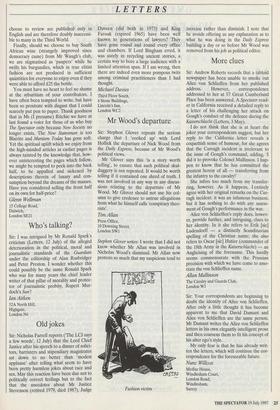More clues
Sir: Andrew Roberts records that a tabloid newspaper has been unable to smoke out Alice von Schlieffen from her published address. However, correspondence addressed to her at 57 Great Cumberland Place has been answered. A Spectator read- er in California received a detailed reply to a letter of his challenging her attack on Gough's conduct of the defence during the Kaiserschlacht (Letters, 3 May).
I do not think that she is at heart the joker your correspondents suggest, but her reply to the California letter reveals a coquettish sense of humour, for she agrees that the Curragh incident is irrelevant to the issue of Gough's command, adding, 'I did it to provoke Colonel Mallinson. I hap- pen to know that he has committed the greatest heresy of all — transferring from the infantry to the cavalry!'
She infers too much from my transfer- ring, however. As it happens, I entirely agree with her original remarks on the Cur- ragh incident: it was an infamous business, but it has nothing to do with any assess- ment of Gough's performance in the war.
Alice von Schlieffen's reply does, howev- er, provide further, and intriguing, clues to her identity. In it she refers to Erik [sic] Ludendorff — a distinctly Scandinavian spelling of the Christian name; she also refers to Oscar [sic] Hutier (commander of the 18th Army in the Kaiserschlacht) — an Anglicising of the forename. This hardly seems commensurate with the Prussian precision with which we have come to asso- ciate the von Schlieffen name.
Allan Mallinson
The Cavalry and Guards Club, London W1


























































 Previous page
Previous page